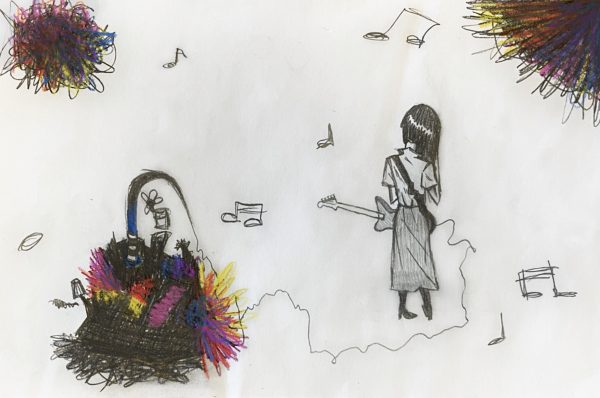Before he cheats: On infidelity in college
If you’ve been cheated on, you’re not alone. I’ve been in that boat before myself. It is an awful feeling, yet I see people cheating on their significant others all the time. I hate to break it to you, but college is not a place that promotes the most moral decision-making.
Infidelity is seemingly everywhere in the twenty-first century. Writers at gossip magazines, such as TMZ, live for uncovering the latest celebrity cheating scandal. TikTok and other social media platforms create avenues for any of its users to expose their disloyal partners.
Celebrity-world cheating and online drama may be far from most people’s day-to-day worries. However, when you go to a college party and observe quite a few people who you know to be in relationships making out with people other than their partner, it becomes difficult to not pass judgment.
Most will agree that infidelity is immoral, according to an April 17, 2018 Asia Sentinel article. At the very core of monogamous relationships is the principle that a couple won’t betray each other, either sexually or emotionally.
However, college notoriously marks a hedonistic period in one’s life. This is particularly true for first-years who have been released from under their parents’ watchful eyes. For the first time, they are able to set their own values and make their own rules.
Randall Harp, a professor of philosophy particularly interested in collective action, free will, and decision theory, had some interesting thoughts on why infidelity can be more common in college.
“I think there’s a few factors that might contribute to college campuses being kind of particularly challenging spots as far as meeting ethical requirements,” Harp said.
Our ethics come from a sense of community, he said. We set our values based on what people around us prioritize. In college, first-years have to establish new circles of friends and therefore new values.
“People are trying to decide what communities are important for them and how to construct the values that they want to live by according to those communities,” Harp said.
Though some people certainly place an emphasis on the importance of their relationship in college, there is a dominant hook-up culture that can influence college students’ desire to value instant gratification over a long-term relationship, according to a 2016 College Student Affairs Leadership article.
If our community prioritizes one-night stands over healthy relationships, then fidelity becomes undervalued and people are more likely to cheat on their significant other.
To complicate things further, relationships are never easy to navigate, especially for college students who are in the middle of developing their senses of self. When conflict arises in a couple, I’ve noticed that one or both parties often lack the emotional maturity to resolve it in a healthy way.
Men tend to justify cheating based off a lack of sexual satisfaction while women often justify their infidelity with claims of emotional neglect, according to an Oct. 10 Regain column.
The issues that lead to cheating are often exacerbated when couples are separated by physical distance. Long distance relationships come with a set of limitations beyond the couple’s control that can be difficult to navigate, according to a May 14, 2019 article by The Atlantic.
When someone in a long-distance relationship starts to feel overwhelmed by the various limitations of geographic separation, they might start seeking out intimacy and emotional connection on their college campus without their partner’s approval.
In my process of investigating this phenomenon at UVM, I talked to an anonymous student source about their experience cheating on their long-distance partner.
“I would beg him to be on the phone and he’d go days without FaceTiming me,” the anonymous source said.
This person was hurt by the neglect of their partner, especially because when they would try to bring it up, their partner would instigate a fight and blame them for being too clingy.
“I guess with other guys […] it was like they’re paying more attention to me than he was,” the anonymous source said.
The anonymous source’s first step towards infidelity was looking for attention and validation outside of their relationship. They felt their partner did not want to prioritize them and their emotions.
The source’s partner was also controlling, and disliked when they would go out with friends at night, despite also engaging in those same activities.
“He’s always been a little bit like that, very possessive […] about who I’m going out with,” said the anonymous source.
For the anonymous source, the controlling nature of their partner was making it incredibly difficult to meet new people or go out without feeling stressed. They wanted to enjoy their college experience but felt constrained by their relationship. Eventually, it all came to a head.
“I went out and did what I did because I was super angry and thought that he had already slept with someone else,” the anonymous source said.
The source ultimately cheated on their partner one night at a basement concert and then broke up with their partner the next day.
They don’t believe the difficulty in their relationship justified their infidelity but they do take into account the influence that their unhappiness with their significant other had on their ultimately seeking the attention of another romantic partner.
Sometimes cheating on one’s partner is not simply a case of succumbing to temptation and making an immoral decision. Infidelity can be a result of deeper problems in relationships.
It is evident that our college community is not set up to encourage the most moral behavior. Whether it is “sexiling” your roommate at an ungodly hour, ghosting your last hookup or skipping a class, college students tend to make selfish decisions.
While one’s natural instinct may to immediately bash the cheater for being a horrible person, sometimes outside factors such as college culture or relationship problems mean cheating isn’t so black-and-white.
I am by no means condoning infidelity—I did not like being cheated on—but looking at all the factors behind the downfall of trusting relationships can help to paint a clearer picture of why someone might act in such ways.
If the college hook-up culture ends up getting to you, just have the courtesy to break up with your partner before you leave them traumatized.










